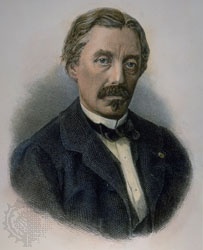Foucault, Jean
French physicist
in full Jean-Bernard-Léon Foucault
born Sept. 18, 1819, Paris, France
died Feb. 11, 1868, Paris
 French physicist who introduced and helped develop a technique of measuring the absolute velocity of light (speed of light) with extreme accuracy. He provided experimental proof that the Earth rotates on its axis.
French physicist who introduced and helped develop a technique of measuring the absolute velocity of light (speed of light) with extreme accuracy. He provided experimental proof that the Earth rotates on its axis.Foucault was educated for the medical profession, but his interests turned to experimental physics. With Armand Fizeau, he began a series of investigations of light and heat. By 1850 he established that light travels slower in water than in air. In the same year he measured the velocity of light, finding a value that is within 1 percent of the true figure.
In 1851, by interpreting the motion of a heavy iron ball swinging from a wire 67 m (220 feet) long, he proved that the Earth rotates about its axis. Such a “ Foucault pendulum” always swings in the same vertical plane, but on a rotating Earth, this vertical plane slowly changes, at a rate and direction dependent on the geographic latitude of the pendulum. For this demonstration and a similar one utilizing a gyroscope, Foucault received in 1855 the Copley Medal of the Royal Society of London and was made physical assistant at the Imperial Observatory, Paris. He discovered the existence of eddy currents (eddy current), or “Foucault currents,” in a copper disk moving in a strong magnetic field, constructed an improved mirror for the reflecting telescope, and in 1859 invented a simple but extremely accurate method of testing telescope mirrors for surface defects.